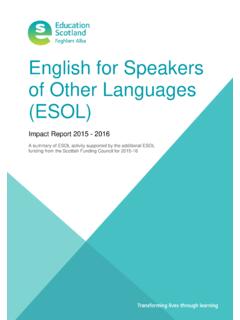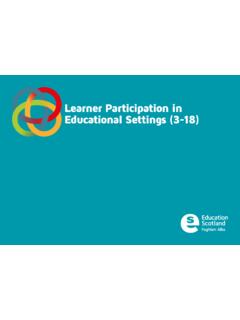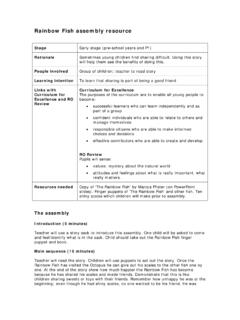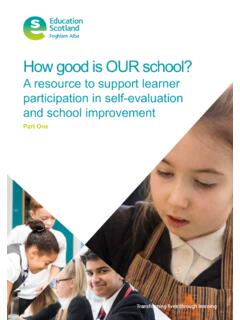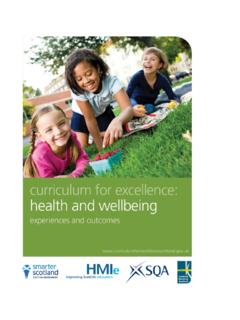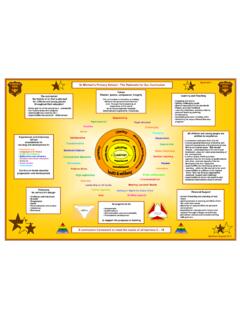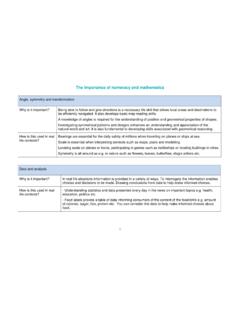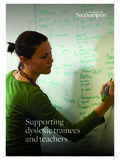Transcription of A professional development framework for Scotland's adult ...
1 A professional development framework for Scotland s adult literacies workforce1 Foreword from Professor Lyn TettContentsSection 1: Purpose and Context1. The purpose of this framework2. The policy context3. The practice context4. Using the framework5. AcknowledgementsContentsSection 2: The Framework1. Role and competences of the adult literacies workforce: Tutor Assistant Group Tutor Co-ordinator2. professional development opportunities: qualifications Table 1: Core qualifications Table 2: Specialist qualifications Table 3: Qualifications with potential relevance to the adult literacies workforce Table 4: Visualising qualifications on the SCQF Table 5: Visualising roles on the SCQF3.
2 Other professional development opportunities4. Potential progression pathways23 Current nationally recognised literacies teaching/tutoring qualifications, placing these within or alongside wider professional development frameworks, including those for Community Learning and development and colleges, and the SCQF, and routes into and progression from these qualifications Other professional learning opportunities that will enhance adult literacies practice Opportunities for other complementary practitioners/educators in linked areas of work.
3 To support their understanding and awareness of, and ability to support, adults with their literacies Gaps in, or changes that are required to existing adult literacies qualifications and Gaps in other professional learning opportunities that will enhance adult literacies was my pleasure to chair our very committed working group comprising:Daniel Sellers, Education Scotland (Lead) Aileen Ackland, University of AberdeenFrances Thom, Educational ConsultantJill Little, Fife Council adult Basic EducationKate Sangster, North Glasgow CollegeMarian Healy, Educational ConsultantMary Black, Scottish Qualifications Authority Shirley Grieve, Learning Link ScotlandLiteracies have a strong effect on people s lives and the Scottish Survey of adult Literacies 2009 demonstrated that low literacies can adversely affect people s health and well-being.
4 Financial status and ability to participate in society. This is why it is important that learners have the very best support for their learning from their tutors. The adult Literacies in Scotland 2020: strategic guidance (ALIS 2020), launched on 21st December 2010, recognised this. The refreshed guidelines for raising standards of literacy and numeracy amongst Scotland s adults set out its overall vision as:By 2020 Scotland s society and economy will be stronger because more of its adults are able to read, write and use numbers effectively in order to handle information, communicate with others, express ideas and opinions, make decisions and solve problems, as family members, workers, citizens and lifelong 2 of the guidance focused on the importance of high quality learning and teaching so that learners can achieve their goals and this required a skilled, competent and confident professional workforce.
5 The professional development Working Group was established by the ALIS 2020 Strategic Implementation Group (SIG) to investigate how this Outcome 2 goal could be achieved. Specifically, the group was asked to produce a Route Map that showed:Foreword by Professor Lyn Tett4 The whole group met five times, working electronically between meetings. In addition to whole-group meetings, members of the group also met on numerous occasions to work on specific aspects of the work. The group hosted a discussion event to gather opinions and views from stakeholders and these stakeholders have also provided on-going consultation on our work that enabled us to establish detailed role profiles and guidance about professional pathways.
6 The group also carried out sixteen interviews with selected adult literacies practitioners from across Scotland. In addition an analysis of research data describing qualification levels of the current adult literacies workforce was undertaken by SQA, commissioned by the Scottish Government at the request of the these data demonstrated that the adult literacies workforce is highly committed but fragmented and often reliant on short-term intermittent funding with very little professional development and uncertain career paths.
7 These issues need to be addressed if literacies learners are to have the support they deserve. The outcome of the working group has taken some steps towards this by providing an overarching professional development framework and recommendations relating to its professional development framework provides: The policy and practice context relating to the professional development of the adult literacies workforce An analysis of research data describing qualification levels of the current adult literacies workforce Detailed role profiles for key roles in adult literacies work Detailed information about current qualifications that are available to people undertaking the key roles we have identified, and whether these qualifications are core to teaching, relating to specialised roles or areas of work.
8 Or more tangential Guidance about professional development activity which does not lead to qualifications Guidance about professional pathways into roles, for developing within roles, and for progression5We made seven recommendations to the Strategic Implementation Group (SIG) at its meeting in March 2012. We asked the SIG to: recognise the framework as the professional development framework for Scotland s adult literacies workforce approve recommendations within the framework relating to qualifications and progression, and in particular the recommendation that workers, whether paid or unpaid, should be entitled to five days a year professional development activity, pro-rated against a full time role (although this cannot be a requirement on employers we see this as an aspirational goal)
9 Approve the request for funding to form an embedding fund that partners can access to help them embed the framework in their strategic planning. In return for this funding, plans for sustaining the use of the framework in future planning should be required. This fund to be managed by Education Scotland ask SQA to review the PDA: ITALL over the next 12 months, particularly in light of the new PDA: Tutoring adult Literacies at SCQF level 8 ask Education Scotland to explore the development of a qualification or SCQF-credit-rated training to support the embedding of educational guidance across adult literacies partnerships ask Education Scotland to explore the possibility of credit rating three key areas of training (which we deem of great value to the workforce) to increase their value and status.
10 These training areas are (a) Working in Groups With adult Literacies Learners; (b) An Introduction to Specific Learning Difficulties in Adults; and (c) Specific Learning Difficulties: Inclusion and Intervention ask Education Scotland to work with SDS to develop existing literacies awareness-raising materials for intermediaries as interactive, multi-media pieces of trainingWe are pleased that the SIG approved all of our recommendations and we look forward to supporting their implementation. We believe that full implementation of our recommendations will go some way to fulfilling the vision of ALIS I would like to thank all the stakeholders and members of the working group for their commitment to achieving its aims and commend the report to you.

